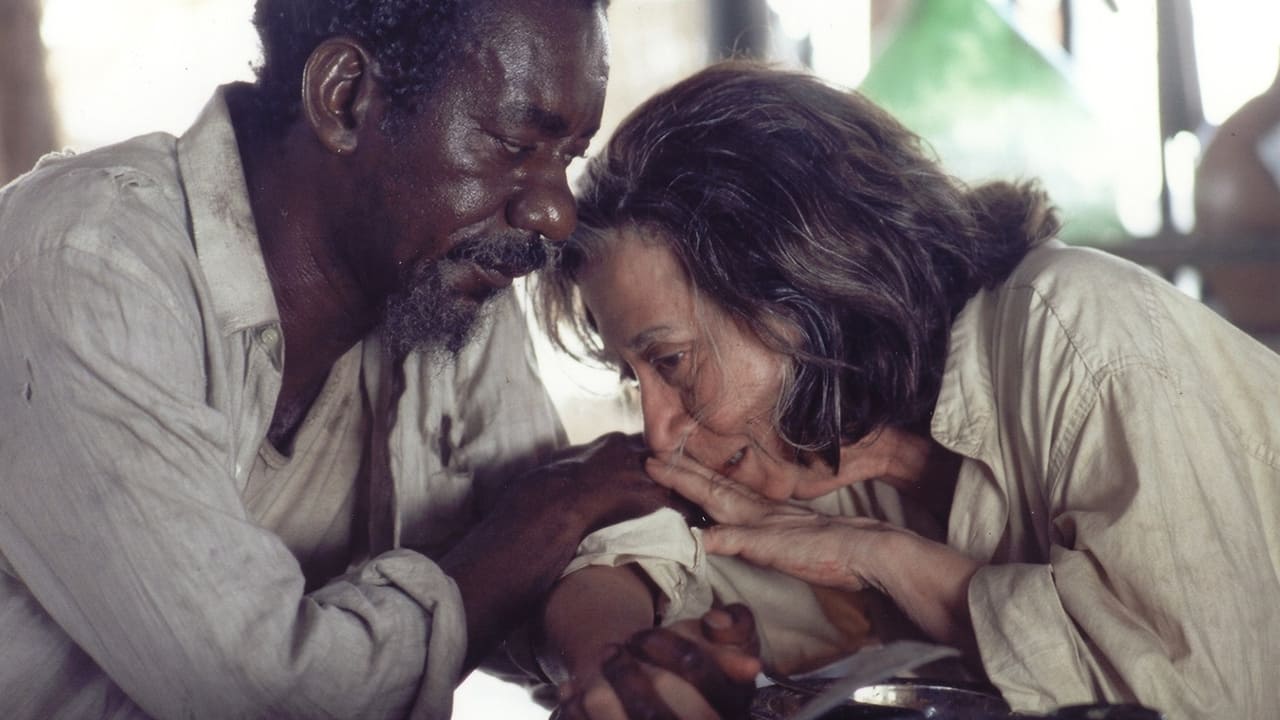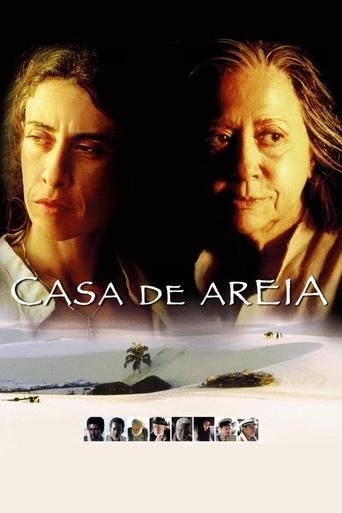Kidskycom
It's funny watching the elements come together in this complicated scam. On one hand, the set-up isn't quite as complex as it seems, but there's an easy sense of fun in every exchange.
Benas Mcloughlin
Worth seeing just to witness how winsome it is.
Kirandeep Yoder
The joyful confection is coated in a sparkly gloss, bright enough to gleam from the darkest, most cynical corners.
Allissa
.Like the great film, it's made with a great deal of visible affection both in front of and behind the camera.
Howard Schumann
Set in the white desert of Maranhao in Northern Brazil where drifting sands can ruthlessly bury an entire house in a matter of minutes, Audrucha Waddington's House of Sand is reminiscent of Teshigahara's great 1964 film Woman in the Dunes but without its dramatic tension or emotional involvement. In House of Sand, there is no struggle for survival against nature or a pervasive feeling of being trapped, only ennui and grudging acceptance, interrupted by casual sex. Based on a story co-written by Elena Soarez and Luiz Carlos Barreto, the film follows three generations of women but confuses the viewer with sudden, unannounced time shifts and interchanging roles played by the lead actresses.In 1910, Aurea (Fernanda Torres), her husband Vasco de Sa (Ruy Guerra), and her mother Dona Maria (Fernanda Montenegro, the real mother of Ms. Torres) travel with other settlers to a remote desert outpost to set up camp on the land he had purchased. Aurea is pregnant and immediately wants to return home after they are approached by black slaves who carry machetes. The settlers soon depart in fear leaving the two women at the mercy of Vasco who has become increasingly brutal and unstable. After Vasco is killed by a falling roof, the two women try to adjust to the harsh life of the desert but look for a way to leave.Their first ray of hope is from salt deliverer Chico (Emiliano Queiroz), from the neighboring area but he dies suddenly from a cough, As the years go by, Aurea's daughter (Camilla Facundes) named Maria after her mother, is now ten years old. The women have been helped to survive by a former slave named Massu (Seu Jorge), now a widower, who teaches them how to get food. Another chance to leave occurs when Luis (Enrique Díaz), a soldier who has come to the desert with a group of scientists to photograph the solar eclipse of 1919, tells Aurea that he will take them out of the desert but fate intervenes. When Aurea returns to get her mother and daughter, she finds that her house has collapsed, killing her mother, though Massu has rescued Maria.Accepting their fate, the two abandon hope of ever leaving the desert, though the story does have a surprise in store for us at the end. House of Sand's camera-work is astonishing with gorgeous shots by cinematographer Ricardo Della Rosa not only of the white sand but also of the pristine sky and the blue sea but the characters never seem to notice the world around them and express no relationship, either emotional or spiritual, to their surroundings. Apart from the visuals, the film has little to say other than -- time goes by and it's not too interesting when you're alone but you can get used to anything and anyway, men come and go but the strength of women endures. All we need is an ersatz ghost to put us in Almodovar territory.
poco loco
Aurea (Fernanda Torres), heads with her visionary husband, her feeble mother and a few deluded colonists through sand dune after sand dune to some marshy land near the sea, hundreds of miles from civilization. Shortly after arriving, the rest of the colonists decide this was a bad idea and take off. Aurea's husband, angry at the quitters, tries to finish his hut himself and within minutes knocks some poles over on his head and dies. Now Aurea, several months pregnant, and her old mother are left pretty much to themselves in the absolute middle of nowhere. They find the remnants of a fugitive slave camp nearby and get a few meager supplies there. They plan on leaving, 10 years later, they are still planning on leaving. Aurea finally hooks up with one of the dudes from the colony and decides it isn't so bad. 20 more years pass, Aurea has transformed into her mother who died earlier in a sand accident and is now played by Fernanda Montenegro and Maria the daughter born in the desert in now played by Fernanda Torres. Maria is a carefree, lazy girl, drinking and hooking up with the local youth. But what can you expect when you live in the sand without civilization.This movie is like eating a picnic on the beach. You've got some egg salad sandwiches, some apple slices and some chocolate chip cookies, but as you eat, you notice a particular crunch. Yes, there is sand in the egg salad, yes there is sand on the apples, yes there is sand in the cookies. But it's not so bad, it's still pretty good. What's more there's sand in your ear and even in your butt crack (where there should never be sand). You have been invaded by sand, but what can you do but lay back and let it take over, it's part of the beach experience. 7/10http://blog.myspace.com/locoformovies
jcnsoflorida
This film is a slow-starter but patient viewers will be rewarded with something quite magical and probably memorable. The 2 lead actresses are very famous in Brazil and their performances here are superb. The film brings to my mind Jane Campion's late 90s 'The Piano', which is similarly arty, demanding on the viewer and takes place years ago in a remote part of New Zealand. One tends to either like it a lot or not at all. I grade it 7.5 and recommend it with the disclaimer that, except for the star power of the actresses, it is not commercial. It's ambitious, arguably pretentious, but effective. If you let it get to you it will.
jotix100
As the story opens on the screen we watch a desert-like landscape that seems uninhabitable, and yet, there is such beauty and serenity in the dunes being formed as the wind pounds on them mercilessly. As the camera rests on some dunes in the distance, we watch as a convoy of people and donkeys are moving slowly in the sand. Whatever possessed Vasco De Sa to buy this land, seems to be incomprehensible; that he tries to make a living out of civilization among the shifting sand is just folly!Little by little we get to know a bit more about Vasco, his wife, Aurea, her mother Maria, as the men he has brought to help him leave them after experiencing the harsh elements in such an arid place. Things aren't made any better when a group of blacks come to see Vasco, who thinks they are going to rob him. He appeases them by giving them some of the things he has brought to this remote place, and we also learn about an island nearby where these former slaves have settled.After Vasco's tragic death, Dona Maria and Aurea, who is pregnant, are left to deal with the elements. After ten years have passed and Aurea has given birth to her daughter, Maria, she goes exploring and discovers a camp where foreign scientists are making astronomy studies. After a night with Luiz, she goes back for her mother and daughter, but finds her house in ruins after the shifting sand has crushed part of it. Only the young Maria survives.The kind Massu, on of the black men from the island, has loved Aurea from afar. Fate and circumstances bring them together by a bond that goes beyond all reason. After years have passed, Maria, who is now a grown woman discovers Luiz, who has returned to the area, not knowing what role he had played in her mother and her lives. Aurea tells her daughter to go with Luiz back to civilization, but Aurea has no desire to see a world she can't comprehend anymore.This exquisitely told story by director Andrucha Waddington is one of the most beautiful films that have come from Brazil in quite a while. The screen play by the excellent Elena Soarez, whose work one has admired as well, collaborates with Mr. Waddington once more in this strange, but highly moving picture about isolation, loyalty and folly. The wonderful cinematography by Ricardo Della Rosa makes everything one sees even better, if that's possible. The magnificent desert location and even the eclipse his camera captures fills one's senses like no other film in recent memory. Joao Barone and Carlo Bertolini's music score is another element that works with all we are watching.Of course, the film belongs to the two magnificent actresses at the center of the story. Fernanda Montenegro and her real life daughter, Fernanda Torres, make a great contribution to create these women of the desert. Fernanda Montenegro is seen as three different versions of the older women in the story and Fernanda Torres plays the young Aurea and the grown up Maria, the girl that was born in that remote area. Ruy Guerra, himself a distinguished director, plays Vasco with conviction. Seu Jorge, Stenio Garcia and the rest of the cast contribute to make this film work.It's curious to note some negative comments mainly from postings by Brazilian contributors to IMDb. The film, which was received with bad reviews, in general, from the media in that country, deserved much better. It's also curious that viewers from other areas get a different message and pleasure after viewing this film.

